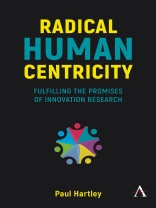There is a problem with innovation research. Many of the methods used to study people for strategic and design innovation purposes are not up to the task. They are holdovers from market research or are simplified versions of tools borrowed from other fields of research. The problem exists because these methods cannot provide the kind of understanding, or grounding in people’s lived experience to meet the requirements of design and strategy innovation. The world is only becoming more complicated, and innovation’s impacts on people’s lives and the environment are only increasing. It is essential we work to fulfill the promises of human-centered research with better research practices, and create positive interventions into people’s lives while resisting the reductionist, damaging, and wasteful tendencies of design thinking research and human-centered design (HCD). This book critiques many of the common methods used in innovation research and provides directions to overcome their weaknesses by developing a radical human-centric approach.
สารบัญ
Acknowledgments; Foreword by Alexander Manu; Introduction; Part I The Critique; Part II Core Considerations; Part III The RHC Approach; An Outline of the RHC Process; Scope; 1.0 The Idea, 1.1 The History of an Idea, 1.2 Assumptions behind a Need for Research, 1.3 The Expectations; 2.0 Framing the Research, 2.1 Getting the Brief Right, 2.2 Hypotheses Are Created to Be Wrong, 2.3 Understanding What Has Been Done Before, 2.4 Connecting the Need with Outcomes; 3.0 Making a Space for Planning, 3.1 The Ethics of Research, 3.2 Choosing the Right Tool for the Job, 3.3 The Right Team for the Job, 3.4 Leaving Space for Failure, Observe; 4.0 Set-up, 4.1 Recruiting, 4.2 The First Respondent Problem, 4.3 Pre-Research, 4.4 Know Your Field Site, 4.5 Thoughts on Screeners, Discussion Guides, and Moderators, 4.6 Planning for Remote/Online Interviews; 5.0 Entry, 5.1 Nothing Goes to Waste, 5.2 Leaving the Consultant’s Ivory Tower; 6.0 In Field, 6.1 Recording Fieldnotes; 7.0 Leaving, 7.1 Getting Out, 7.2 Building Lasting Relationships, Understand; 8.0 Analysis, 8.1 Data Management, 8.2 Actually Managing Complexity, 8.3 Mitigating the Dreaded “Subjectivity”; 9.0 Synthesis; 10.0 Return-Test-Verify-Edit; Generate; 11.0 Insights, 11.1 Description, 11.2 Define, 11.3 Translate, 11.4 Actionability Notes on Activation; Conclusion; References; Index
เกี่ยวกับผู้แต่ง
Paul Hartley is an anthropologist and foresight practitioner. He is the CEO of the Human Futures Studio.












